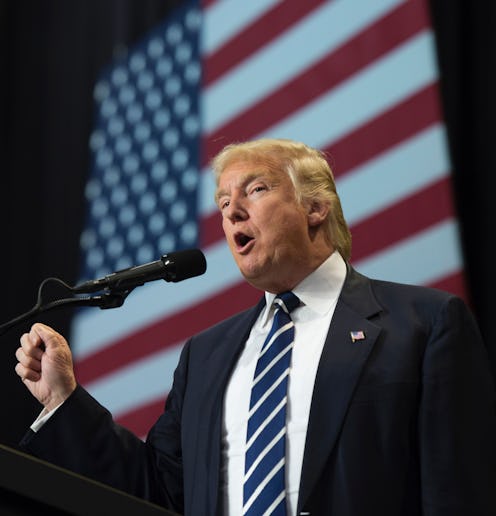News
Will Trump Do Anything About Aleppo?
The state of affairs in the Syrian city of Aleppo has perhaps never looked more dire and more urgent than it does right now. That's not to say things were good a week ago, nor a month, nor a year ― the city has been the site of nearly constant, vicious war for years, a flashpoint in the Syrian civil war. And with a new American administration incoming, it seems a vital time to ask: What will Donald Trump do about Aleppo and about the ongoing clashes between the Syrian government, anti-Assadist forces, and terrorist groups like ISIS and the Al-Nusra front?
The fighting began back in 2011, and has since spun out into a conflict between at least five distinct factions, and with thousands upon thousands of innocent civilians losing their lives, whether slain by terrorist violence or by deliberate attacks by the Assad government. The instability and horror has helped fuel a mass displacement of millions of Syrians, causing a surge in the global refugee population that the rest of the world has so far been ill-equipped, and often unwilling, to accommodate.
On that note, it's no secret where Trump stands ― he's vehemently anti-refugee, repeatedly describing Syrians who've fled their homeland as a major terrorism threat, and promising a program of "extreme vetting." As for his proposed solution in Aleppo, however ― which effectively fell to Assad's forces and cooperating foreign militias this week, setting off a slew of absolutely horrific war crimes ― it could best be described as "let Russia and Assad handle it."
Specifically, when questioned about Aleppo and Syria, Trump has routinely suggested that Assad and Russia should be allowed to operate with relative impunity, because "they're killing ISIS." Here's what he said during the second presidential debate.
I don't like Assad at all, but Assad is killing ISIS. Russia is killing ISIS and Iran is killing ISIS.
By virtue of his incendiary rhetoric about terrorism, ISIS, and indeed, the Islamic faith overall, anyone who's engaged in armed conflict with ISIS is going to earn some amount of Trump's favor. That's essentially the North Star of his stated views on Syria.
When he was specifically asked what course of action he'd pursue in Aleppo during the third and final presidential debate, however, his answer was a classic, meandering Trumpian word salad, one that doesn't instill much confidence in him personally having any deep knowledge on the subject. But he did make it clear that he doesn't support Assad's ousting, because whoever replaced him could be worse.
But if they ever did overthrow Assad, you might end up as bad as Assad is, and he is a bad guy. But you may very well end up with worse than Assad. If she did nothing, we'd be in much better shape.
In short, despite the fact that Assad is as brutal a dictator as the world has right now, and despite that fact that Iran and Russia are historically major geopolitical opponents of the United States, so long as Russian, Iranian, and pro-Assad forces can be literally or nominally said to be fighting ISIS, that's likely benefit them in Trump's current worldview.
Trump also vigorously opposed Hillary Clinton's proposals to institute no-fly zones over Syria, one of the instances in which his stated foreign policy proposals was widely seen as less-hawkish than hers ― the imposition of no-fly zones would have heightened the potential for widened international warfare, as it easily could've brought Russian jets into direct, armed conflict with the United States. Trump also insisted during the third presidential debate that Assad was "much smarter and much tougher" than Clinton and President Obama.
For what it's worth, Assad himself is clearly optimistic about Trump's pending inauguration. As Reuters detailed, Assad just commented on Trump during an interview, saying "if Trump can genuinely fight against terrorism, he can be our natural ally." Regardless of whether you support deeper U.S. military engagement in the country or not, that's a bit of a stomach-turning reality to consider ― one of the world's most oppressive and blood-drenched dictators feeling cheery at the prospect of the incoming American president.
As far as the conflict in Aleppo specifically is concerned, however, it's clear that Assad and his sympathetic forces are moving to seize the city in violent and absolute fashion before Trump takes power, perhaps as a means to exploit the current period of upheaval during the presidential transition. In other words, it's impossible in the current state of flux to know precisely what will remain of Aleppo by the time Trump takes power in January, and thus what angles he'll have to consider.
